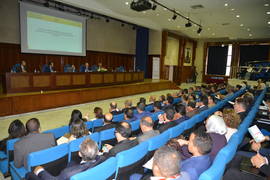
"DIGITAL TRUST AND CYBERSECURITY: PILLARS OF DIGITAL TRANSFORMATION IN MOROCCO"
Digitalization now affects all actors in our societies. Administration, businesses, and individuals see their activities impacted by digital transformation. The conquest of the digital space has become a reality, as evidenced by the exponential increase in the number of computers, smartphones, and connected devices. Several tens of billions of smart objects will be interconnected tomorrow, representing potential hunting grounds for cybercriminals. Securing cyberspace to preserve trust in digitalization thus becomes a major national issue.
Indeed, in this new era of transformation, digital trust is a major lever for the development of countries, both economically and in terms of citizen services. This trust cannot be achieved without a great mastery of cyberspace, through a real defense and security strategy, and through information and awareness-raising actions involving various societal actors, to make digital transformation a real opportunity for our businesses and a vector of innovation and growth for our country.
Clearly, the success of digital transformation depends closely on actions and measures to enhance user trust. However, this digitization of the economy faces a real challenge due to the proliferation of cyber threats: cybercrime, espionage, abusive use of personal data and information find in cyberspace a new theater of operations and a new field of expression.
Responding to security and digital trust challenges is a key factor for economic development, as it allows companies to innovate, governments to provide trusted services, and consumers to access these services securely. Given the importance of these challenges, it cannot be solely the responsibility of the information systems security manager or digital technology, digital trust must become a priority for government bodies, business leaders, and a collective concern of citizens.
Morocco, which aspires to position itself among dynamic emerging countries in information and communication technologies, has recognized digital trust as an indispensable accompanying measure for anchoring the country in the digital economy. The Morocco Digital 2020 plan, recently launched by the Ministry of Industry, Trade, Investment, and the Digital Economy, which aims to make Morocco one of the most performing countries in the Middle East/North Africa region in terms of information and communication technologies, also relies on three pillars that are heavily dependent on trust:
Accelerating Morocco's digital transformation;
Bridging the digital divide;
Making Morocco a regional digital hub.
The implementation of these strategic orientations, decided at the highest level of the state, relies on the establishment of a real chain of trust, allowing to provide consumers (institutions, businesses, citizens, etc.) with end-to-end secure services. These services should address users' main concerns:
Integrity and quality of service: providing secure and flexible technological platforms for the digital economy and offering users an optimal customer experience;
Prevention against hacking: protecting information against theft or unauthorized use and taking appropriate measures in case of abusive use or dissemination of false information;
Protection of privacy and personal data: addressing issues related to individuals' security and the respect of their personal data;
Protection of sensitive information systems of vital infrastructures.
In this regard, in addition to the National Information Systems Security Directive, issued in 2014 and aimed at standardizing the levels of protection of state information systems through the implementation of a set of basic security rules, efforts have been made in 2016 to adopt a device aiming to extend this protection to sensitive information systems of vital infrastructures. This device notably involves strengthening internal supervision within the various stakeholders through the establishment of Security Operations Centers (SOC). It also involves technical and organizational mechanisms related to efficient management of cybersecurity incidents.
Other initiatives related to trust development have also been undertaken by DGSSI. This includes, on the one hand, the project to strengthen the resilience of the Internet in Morocco, the main means of access to trusted services. On the other hand, it involves the launch of a study to develop a roadmap for the development of electronic certification at the national level.
Thus, with a view to meeting the imperative of supporting digital transformation in Morocco and establishing an agreement on appropriate security measures that can be applied to enhance digital trust, DGSSI organized on May 23, 2017, the 5th edition of its annual awareness seminar under the theme: "Digital trust and cybersecurity: pillars of digital transformation in Morocco".
This seminar revolved around three panels that addressed the following themes:
Digital trust and security-related challenges: What is the link between cybersecurity and digital trust? What strategies for the development of digital trust? National and international experiences shared;
Trusted services: How to build and develop them securely, ensure their resilience and accessibility, and manage their security;
Digital trust and efficient management of cybersecurity incidents: How to control the impact of these incidents on user trust.
This edition saw the participation of more than 500 people representing directors of information systems and information systems security managers from administrations, public bodies, and Critical Infrastructures.
To report any criminal digital content, including threats to the security of individuals and groups, praise or incitement of terrorism, and violations of the rights and freedoms of children, please use the following platform : www.e-blagh.ma
DGSSI2025 All rights reserved